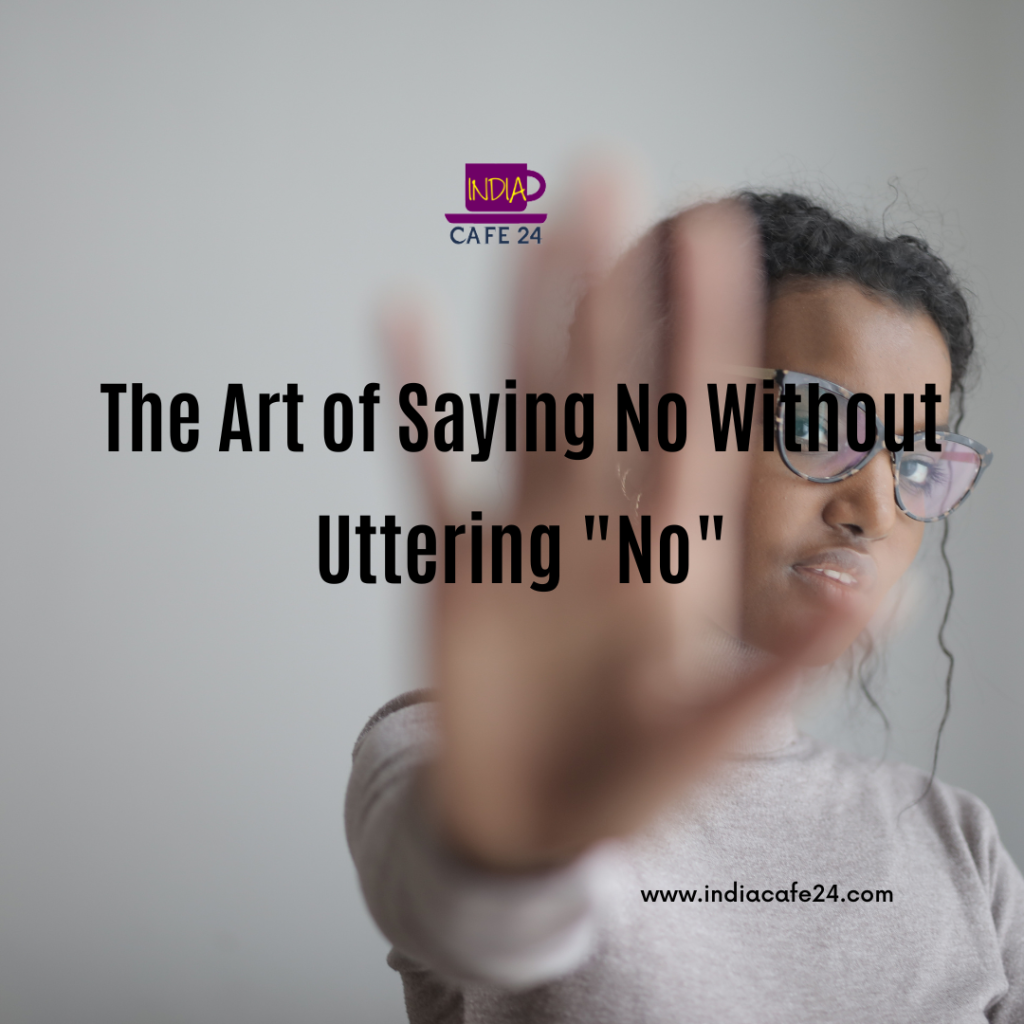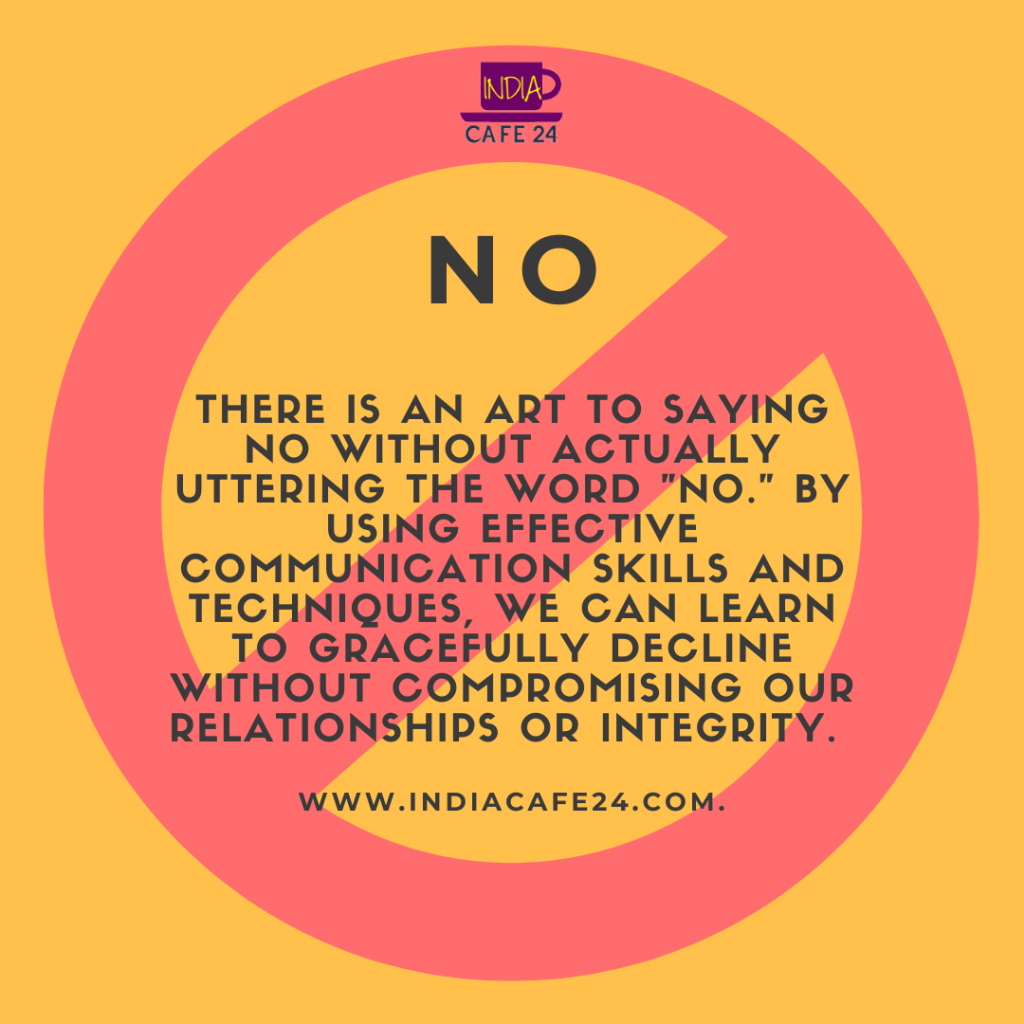The Art of Saying No Without Uttering “No”
The Art of Saying No Without Uttering “No”
Is it challenging for you to refuse when someone requests you to do something? We all face situations where we want or need to say “no,” but are afraid of the consequences that might come with it. Whether it’s declining a social invitation, turning down a work request, or refusing a family favor, the fear of disappointing others or being seen as uncooperative can often lead us to say “yes” even when we intend to convey “no.”
However, there is an art of saying no without actually uttering the word “no.” By using effective communication skills and techniques, we can learn to gracefully decline without compromising our relationships or integrity. In this post, I will share some tips and strategies for saying no assertively and confidently while maintaining positive relationships with others.
Here are ten respectful ways to decline a request without using the word “no”:
1 Offer An Alternative Solution
One way to say no without using the word “no” is to offer an alternative solution. For instance, “I really appreciate the offer to go out tonight, but I have an early morning tomorrow. How about we plan something for next weekend instead?” It demonstrates your regard for the relationship and the readiness to dedicate time to it, but solely on your own conditions.
2 Express Gratitude
You can say no without using the word “no” by expressing your gratitude, for the request. For example, “Thank you so much for thinking of me for this project, but unfortunately I don’t have the bandwidth to take it on right now.” This acknowledges the gesture of the invitation, while also setting a firm boundary.
3 Be Honest
Being honest is always the best policy, even when you are saying no. You can say that you are not the best fit for the task or; that you don’t have the required skills. As an instance, you might express, “While I am grateful for the offer, I don’t believe I possess the required experience to undertake this task.”
4 Use Humor
Humor can be an effective way to say no without using the word “no.” For example, you could say, “I would rather stick needles in my eyes than do that task,” which communicates that you won’t do the task but in a lighthearted way.
5 Say It’s Not A Priority
If you don’t have time or don’t want to do something, you can say that it’s not a priority for you at the moment. As an illustration, you may convey, “As of now, I have different priorities, and I won’t be able to do this task.”
6 Delay Your Response
If you need time to consider a request, you can delay your response. For example, you could say, “Let me think about it and get back to you.” This gives you time to evaluate the request and come up with a response that doesn’t involve the word “no.”
7 Be Assertive
Being assertive means standing up for yourself while also respecting the other person. You can say no assertively by expressing your needs and boundaries clearly. For example, you can say, “I appreciate the opportunity, but I’m unable to take on any additional projects at this time. I need to focus on my current workload and personal responsibilities.”
8 Provide A Reason
You can say no without using the word “no” by providing a reason for declining the request. For an instance, you could apologize and state, “Unfortunately, I can’t undertake this task as it clashes with my other commitments.”
9 Use “I” Statements
Using “I” statements is a way to express your feelings and needs without blaming or attacking the other person. For example, say something like, “I respect the offer, but at this time I need to prioritize my health, so I won’t be capable of taking on the work.”
10 Thank The Person
It’s always good manners to thank the person for their request, even if you can’t fulfill it. For example, you could say, “Thank you for thinking of me, but I won’t be able to take on this task.”
To summarize, the ability to say no without using the word “no” is a valuable skill to possess in both personal and professional life. By using the ten-pointers we have discussed, you can decline requests in a way that is respectful, assertive, and clear. It’s essential to remember that saying no is not a reflection of your worth or value, and it’s okay to prioritize your needs and boundaries.
Learning to say no effectively can help you reduce stress and overwhelm and create space for the things that matter most in your life. So, the next time you need to decline a request, remember that there are ways to do so without using the word “no,” and practice using these approaches to develop more confidence in setting limits and expressing your concerns.
This blog post is part of theblog challenge ‘Blogaberry Dazzle’ hosted by Cindy D’Silva and Noor Anand Chawla in collaboration with Mads’ Cookhouse.













I wish I had read your post 40 years ago. I have always been a yes-man. Only 2 years ago I started valuing my time and gently learning to say no. Your tips will surely help me tackle it better. Thank you for this.
Co-incidentally, I had to say no to someone and was totally lost. Was wondering how to say no without sounding harsh….and here’s your post to rescue me!! So many options to choose from and I was struggling to find one 🙂
I have learnt it the hard way to say No politely without offending. I had a habit of just putting my opinion out instantly. Now, I sit back and reflect and find the right words. Good tips.
Oh my my Samata… your post took me back to the time when I was a trainer and i had to take sessions on saying No positively.i am so nostalgic now. But, a very helpful post and a great life skill uv taught us here👍
Great suggestions. I am very particular. I say no if I don’t want to do something whether the other person likes it or not. No point in saying yes and then suffering.
I still struggle with saying no although I am getting there. Great tips. Explaining the no is perhaps the best way to go about it. There is a much better chance of it being accepted.
I face these issues everyday. My family scolds me every now and then for damaging my own state and keeping others happy even if that means hurting myself to the best of what I can. I needed this post. As its written in your post that with good communication skills we can learn this sounds outstanding.
I am a highly gullible person, not that I am proud of. I find it extremely difficult to say no to the face. Kind of a people pleaser .
Will try your polite methods.
I used to be the person who could never say no but with time I learnt to say it. I normally use the techniques as illustrated by you but sometimes when I am packed with work I actually directly say no.
Those who learn this art will indeed be a millionaire. I feel conversation, the way, the style you deliver the matter in is what makes it easier to say a NO. Else if you give a bang on “NO” then finished you’ll have thousands of other things forcing you to say a YES.
Your all suggestion are great. I am the person who not able to say NO. Thanks for all suggestion. I will try it out. Serious we should learn to say No, because it is need for ourselves. Thanks you for this beautiful post.
Loved this post-Samata. But I am still learning to say ‘No.’ Saying no can be one of the most difficult things to do, especially when we want to avoid disappointing others or being seen as unhelpful. However, constantly saying yes to others can lead to feeling overwhelmed, stressed, and even resentful.
-Anjali
Great ideas! Saying No is really something a lot of people learn when they start to embark a lifestyle change and stumble with this easily said yet utterly difficult thing to do. It’s common as humans to try to win the hearts of others in any way possible. This results to finding difficulty to say “no” to others despite not really willing to do things. A must read for everyone!
I find it extremely difficult to say ‘NO” and sometimes go all out of my way to help people. I don’t mind that part, but when I need help there is no one to come to my rescue. Once bitten twice shy, your blog is something that I so needed to read and everything you mentioned is so doable. Thanks a ton for it.
It is indeed an art to say no & still be liked. Your post has some great tips. I do have a diff opinion on the point of providing reason….may not be necessary to give a reason many times. Sometimes if you even don’t feel like it, it is a good enough reason….but if you say it out loud to people they may not really be appreciative.
Saying “no” can be one of the most challenging things to do, especially when you’re afraid of the consequences that might come with it. But learning to say “no” effectively is crucial to maintaining positive relationships and respecting your own boundaries. The good news is that there are several ways to decline a request without actually using the word “no,” as you have shared.
Love how you’ve structured your post! And, obviously, that bunch of tips is something all of us could do with, so great work compiling them and explaining them so practically.
This is very helpful! Over the time we eventually say yes all the time and it is being hard to say no. your tips are something that help people
I always find it difficult to say ‘NO” and sometimes go beyond of my way to help people. But when I need their help, there is no one to come to my rescue. Loved the way you make the pointers that how to say No. Really helpful article.
Saying no to anyone was once the most difficult thing for me but I’ve learnt to do it now, gently but effectively. You’ve suggested some good and easy ways to do it. Humour can backfire sometimes though.
What a helpful post especially for someone like me who find it really difficult to say no. And even if I say no, many times I end up hurting the other person. So the tips that you have shared are very very helpful.
Using humor to say no stood out to me because it sounds so light hearted plus so positive. Beautiful post so vivid way of telling no.
We as Indians have it in our culture, we really find it difficult to say no, and think that it is rude. However that are so many ways of saying something negative in a positive manner, and you have enumerated some of these.
I completely agree with this post. Saying “no” can be difficult, especially in situations where it’s not easy to explain why you need to say no. It’s important to remember that respect for ourselves and our boundaries should come first, so we should never feel guilty about saying no when it is needed. Having that said though, I believe there are effective ways to say no which can be beneficial for both parties involved. It’s about striking a balance between being assertive and understanding the other person’s point of view. As we learn better communication strategies, it hopefully becomes easier to express ourselves in situations where “no”. I’m sure this article will benefit so many people.
Lol I need to implement this everyday as saying on in Corporates is another level of issue. 🥹 but i love your ideas of giving alterations solutions so that people wont get disappointed and its a smart move. ✌🏻
Sometimes it is important to say No. However, most of the time, especially women feel hesitant to say No. This book seems important to learn the art of saying NO.
Learning to say no is important in attaining success. Of all the tips that you share using I statements are the most effective.
I really need to learn how to say no coz I have this habit of falling into weird situations co I couldn’t say no
Your article is super helpful for lost souls like me thank you for sharing this
Some great tips for a universal problem!